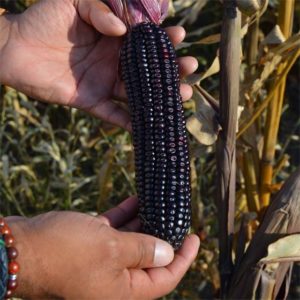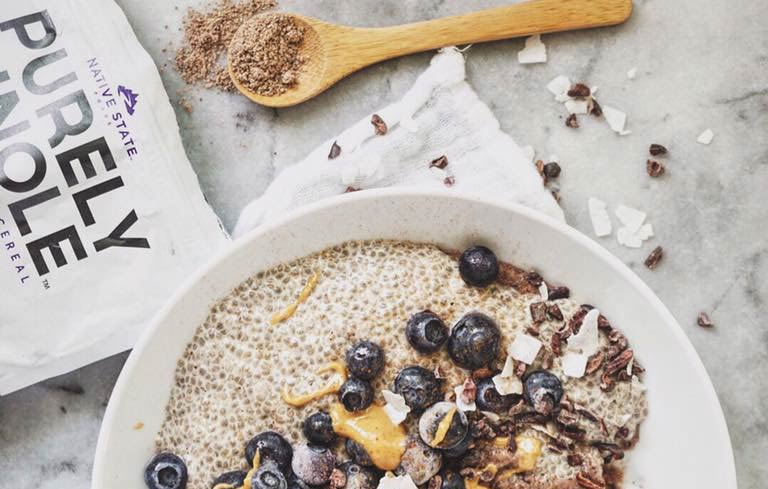The best things in life are often not new, but rediscoveries of traditions persisting in tucked-away corners, kept alive by wise guardians. Pinole, an ancient power food first cultivated by the Aztecs in Mexico and Central America, is one such cultural gem—a nutrient-rich food recipe that generates superior endurance, energy, and health. This coarse ground powder, consisting of roasted purple maize, cacao beans, and spices, helps the Tarahumara Indians of Mexico’s Copper Canyons to run hundreds of miles every few days, and maintain lives without cancer, diabetes, or heart disease. Recent New York Times bestseller Born to Run documented the Tarahumara runners and their astounding endurance, arousing interest in pinole’s protein, fiber, whole grains, and high anti-oxidant levels. Often consumed as a hot porridge, pinole today fuels not only athletes but children—whose moms embrace a healthy breakfast alternative which their kids actually like.
“Purple is the new Green”
Native State Foods is the first company to introduce this 500-year old recipe to the U.S. in its original form. Claudio Ochoa can attest to its allure—a memory of eating pinole during summers spent in Honduras prompted a desire to make it available again in its pure form. The Purely Pinole products—hot cereals coming in three flavors, and grab-and-go snack cups available in four—meet the criteria of “superfood,” and are non-GMO, gluten-free, low sugar, and soy-free. They’ve caught the attention of celebrity chefs and received investment from innovative packaged food promoter Accel Foods; the product can be used in breads, cookies, smoothies, or customized bowls. A top finalist for SupplySide CPG Editor’s Choice Award in 2015, Purely Pinole could be a poster child for a key food trend for 2017: “Purple is the new Green.”

Pure Pinole founders, Angela Palmieri (far left) and Claudio Ochoa (far right) and farmer partners, Deb Starr and James Starr (middle)
When co-founders Ochoa and Angela Palmieri left New York in 2014 in search of the original pinole recipe in small markets in Central America, they left behind stressful lives in corporate law and marketing. Settling in Santa Monica, they pondered how to recreate the formula.
“This ancient recipe used particular ingredients, and involved roasting for hours in an adobe oven, using special types of wood for smoking,” Ochoa said. “We had to find quality purple corn, and a way to mimic how it was cooked—everything as close as possible to the original.”
Fortunately, Suntava, a brand of Healthy Food Ingredients (HFI), had developed a purple corn variety that originated in Peru—a non-GMO seed going back several hundred years. Seed breeders developed new non-GMO and organic varieties of the corn with more disease resistance and value-added nutritional benefits.
HFI contracted Joel and James Starr, fourth generation Nebraska organic farmers to grow 40 acres of the purple corn for Purely Pinole last year. The Starr brothers also grow corn, soy, aronia berries, and a high-protein purple wheat from Ethiopia on their 1200-acre farm.
“When we first encountered purple corn we thought it was novel, and we started growing it. Claudio would like 200 acres of the organic purple corn next year…we’ll see,” Joel said. “It’s a good enough fit for Nebraska, but I wish the yields and price were higher.”
Non-GMO Project Verified
Contamination is a threat for the brothers—last year, a neighbor grew the GM variety Enogen, used for ethanol, just a quarter mile away. Working with his neighbor, he plans to stagger his planting or perhaps grow popcorn on those acres (it doesn’t accept GM corn pollen).

Purple corn used to make Pinole
“This purple corn, the ancient grain, is the ideal fuel—a slow-burning carb. It’s got 40 grams of whole grains per serving and three to four times as many anti-oxidants as blueberries,” Ochoa said. “Pinole, along with chia seeds, allowed the Tarahumara to run the equivalent of four to five marathons in a few days.”
Purely Pinole is manufactured in a facility in Chicago, using a proprietary process that mimics original techniques. The entire line is Non-GMO Project verified, providing the transparent seed-to-shelf product the founders insist on.
“The Project certification is rigorous—facility inspections, annual audits, ongoing testing of high-risk ingredients—but it’s worth it to have that label,” Claudio said.
The West Coast (primarily California) and Northeast are the two primary marketing regions for Purely Pinole products. They can be found at Sprouts, Wegman’s, Whole Foods (L.A.), Thrive Market, online, and at other natural retailers. The company hopes to expand next into the Rocky Mountain and Pacific Northwest regions.









